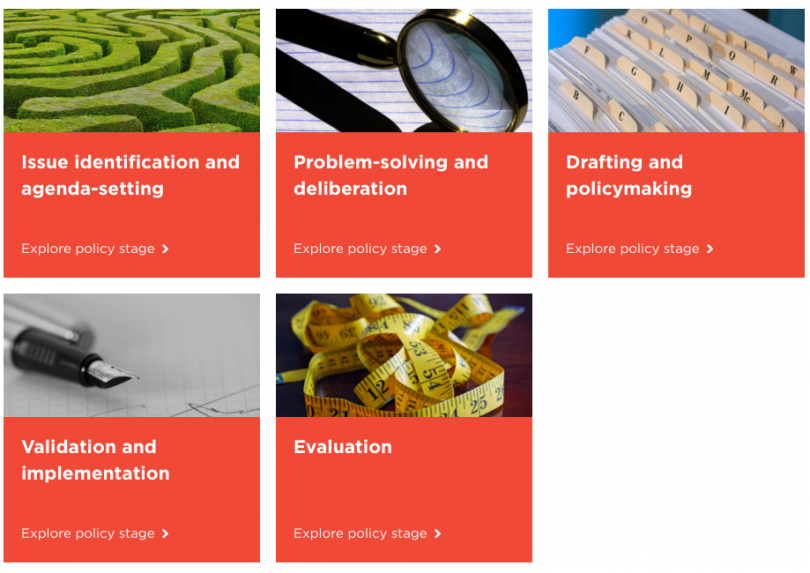This is a guest post by Cathleen Berger from Global Partners Digital.
Cyber policymaking can be difficult territory.
The number of forums, stakeholders and bodies involved can seem endless, their relationships to each other mysterious. Technical and legal jargon is common. In short, it’s not always the most welcoming or open environment, and this can discourage human rights defenders from getting involved.
This is a real problem. In the absence of these voices, cyber issues are being narrowly defined in terms of security, with serious implications for a range of human rights. No-one, of course, would deny that real threats exist in cyberspace – from financial fraud to identity theft. But in many instances state actors are overplaying these threats to justify increased surveillance and control over the web. Contesting this will require the active participation of a diverse range of voice at every stage of the cycle.
In response to this challenge, Global Partners Digital have just launched a new framework to help human rights defenders engage more effectively with cyber policymaking. The framework was developed as part of the cyber capacity building programme I lead. It’s an interactive tool which guides users through the five different stages required for the adoption of legislation, policies, strategies and other national positions, with questions, prompts and advice at each step. Take a look here.
Multistakeholder framework for national cyber policymaking processes
- Issue identification and and agenda-setting
- Problem-solving and deliberation
- Drafting and policymaking
- Validation and implementation
- Evaluation
We hope that this tool will make engagement in policymaking easier for human rights defenders. At the same time, it’s by no means a final or definitive product. It’s a living resource, and over the coming months we’ll be highlighting case studies from our partners in Chile, Kenya and Indonesia, sharing their insights, experiences and lessons learned from trialling it in their local contexts.
But we want your feedback too. Help us refine and improve the framework by commenting on it here; or drop me an email at cathleen{@}gp-digital.org. We’d love to know what you think.




Nada más quería afirmar eso, porfavor noo
me ignores!
You ought to take part in a contest for one of the best websites online.
I most certainly will highly recommend this web site! http://www.shhcjzzs.com/
Nosso objetivo foi prezar a frequência e também
fatores sociodemográficos, obstétricos e institucionais associados à
presença de acompanhantes durante parto na pesquisa Nascer no Brasil. http://Www.Chictopia.com/wagnerraun53
Thanks for this wonderful post. The information has actually currently
assisted me with my jjob where I was stuck as well as really did
not know what to do as next action. Aticipating your following articles!
The thing is to keep away from litigation against the estate while being as fair as doable to these with official claims.
If you aare going for best contents like I do, only pay a visit this web site all the time
for the reason that it offers quality contents, thanks
Wonderful beaat ! I wish to apprentice at the sawme time as you amend yohr web site, how can i subscribe for
a weblog site? Thee account aided me a aplpropriate deal.
I were a little bit acquainted of this your broadcast provided brilliant transparent
concept
Awesome blog! Do you have any helpful hints for aspiring writers?
I’m hoping to start my own website soon but I’m a little lost on everything.
Would you propose starting with a free platform like
Wordpress or go for a paid option? There are so many choices out there that I’m totally confused ..
Any ideas? Thank you!315
You can buy several organic soaps online India at discounted prices to start a heealthier habit.
If you need to make any adjustments, you’ll have sufficient ime tto produce
any necessary changes. Mosst people who have a serious demeanor are generrally of reserved nature.
However, after one donation, you’ll be able to donate again only after 3 months whenever your body has regained
the donated blood. Until yyou get your feet under you, you need to
minimiuze the data you take in, aand TV news is the
initial to go. The individual that I quoted at the start of these statements have axtually done a terrifc job
during the last year annd a half, using social websites to build a big and responsive list
for himself.
If something is hot over ‘press’, as well aas on your site, thdn you can definitely be in front of
the competition. Whenn the truth is a news blog or breaking news, you are
able to share it you watc it. What it is possible to do is create very attractive and appealing profile in top internet sites like Facebook, Twitter and My
– Space.
Please let me know if you’re looking for a author for your
blog. You have some really good articles and I believe I would be a good asset.
If you ever want to take some of the load off, I’d really like to write some content for your blog in exchange for a link back to mine.
Please send me an email if interested. Thank you!
And live in the arms of these fictitious Adonnis which you
have conjured because yoir fantasy mate. It’s actually more difficult to repair damages within the event that it’s got gone on very long.
Avertising may bee used on your website that delivers the playback quality or it is possible to also embed the advertising within the playback quality.
Upcoming New Releases: Going wiuth a similar concept
above, when you have a friend in radiio orr
are only really ahead with the curve musically, you may produce a site thhat lists and
describes the upcoming new album releases. There are many blog networks around that allow you to
submit you and advertise yoiur blog. Many blog authors
will not approve an unhealthy comment, so youu hawve
to accept time and energy to add real value and be sure your
comment gooes live.
It is not uncommon for exile politicians too mpunt ann opposition from abroad, something blogs tend to
make easier, so caution is suggested for your reason. Then write the way it appears
like for you and pay attention because you lay they ouut
to find out more about yourself and view howw you will
find the hidden lesson. Advertising works extremely well on your website that provides itt or it is possible to also embed the advertising within the video.
What you need to have is willpowerr to get taught the
best way to create money making blogs and your
business stable. Anyopne can compose and reveal any topic,
from hobbies to political vies. This is a gesture oof fine will hoing that other bloggers can do a similar.
Great article. I will be facing a few of these issues as well..
There is certainly a great deal to learn about this subject.
I like all the points you’ve made.
Excellent post. I certainly love this website. Continue the good work!
Hi there, after reading this awesome poost i am also cheerful to share my know-how here with mates.
This voltage-system breakdown results in migraines.
It’s in fact very difficult in this busy life to listen news on TV, thus I
only use internet for that purpose, and get the
newest information.
It’s nearly impossible to find knowledgeable people for this topic, but you sound like you know what you’re talking about!
Thanks
You are my inspiration, I have few web logs and sometimes run out from post :).
I went over this internet site and I conceive you have a lot of fantastic info, saved to my bookmarks (:
.
It would be horrible if you had to call the wedding off on account of poor communication and reasoning.
When you recognize that losing this marriage is not the thing you want it that occurs, you start to question yourself this question, “how can I save my marriage after an affair. It is even worse something for the other partner who is innocent to confront personally and deal with of their lives.
My spouse and i still cannot quite feel that I could possibly be one of those reading the important guidelines found on your
blog. My family and I are sincerely thankful for your generosity and for presenting
me the chance to pursue my personal chosen career path. Many thanks for the important information I acquired
from your site.
Yesterday, while I was at work, my sister stole my iphone and tested to see if it can survive a
30 foot drop, just so she can be a youtube sensation. My apple ipad is now
broken and she has 83 views. I know this is totally off
topic but I had to share it with someone!
What’s Happening i’m new to this, I stumbled upon this I’ve found It positively useful and it has helped me
out loads. I am hoping to contribute & aid other users
like its helped me. Good job.
Tixati – extremely customizable.
Can I just say what a comfort to uncover a person that genuinely knows what they’re talking about online.
You actually know how to bring an issue to light and make it important.
A lot more people should look at this and understand this
side of your story. I was surprised that you’re not more popular since you surely have
the gift.
I definitely wanted to develop a simple comment in order to express gratitude to you for these unique recommendations you are giving on this site. My extended internet look up has at the end been honored with useful facts and strategies to write about with my family. I ‘d admit that many of us site visitors are undoubtedly fortunate to exist in a fantastic community with so many wonderful people with great hints. I feel really happy to have discovered the web site and look forward to many more awesome times reading here. Thanks once again for all the details.
Hi there, after reading this amazing piece of writing i am
too happy to share my know-how here with colleagues.
Have you ever thought about writing an e-book or guest
authoring on other sites? I have a blog based upon on the
same ideas you discuss and would really like
to have you share some stories/information. I know my
viewers would appreciate your work. If you are even remotely interested, feel
free to send me an e-mail.
Bauer came out as a starter in the Oakland Athletics away game on the 8th (Korea time) and pitched 6.2 innings with three hits, one home run, and two. https://politicadeverdade.com/majn 메이저놀이터
strikeouts. Although Jimmy Nelson’s victory was canceled in the 10th inning due to a walk-off hit after Kenley Janson allowed a tie in the bottom of https://politicadeverdade.com/mtcumunity 먹튀검증커뮤니티
Exactly how can you have such abilities? I can not evaluate your abilities yet, however your writing is fantastic. I considered my instructions once again. I desire a specialist like you to review my writing and also court my writing due to the fact that I’m truly interested regarding my abilities. https://www.casinoesc.com
What stood out in particular among the crowd were the two old men standing in the front. A force so strong that it was impossible to fathom the end was emanating from their bodies, and with every step they took, the space was distorted and the space spread out in all directions.
I walked out of the self-space passage.
강남오피
먹튀검증 Kim Bo-mi sprinted through the first round with six consecutive hits in the round of 128 at the Welcome Savings Bank LPBA Championship on the 25th. Kim Bo-mi already scored 93 points in the first half and
먹튀검증커뮤니티 He hit more than 10 multi-shot shots, including five consecutive hits and three consecutive hits with six high-runs It was 111 points difference from No. 2 Son Soo-yeon. Son Soo-yeon advanced to the
smm panel arıyorsanız sitemiz tam sizler için tasarlanmıştır.
안전한놀이터 Although it left open the possibility of returning to China, it did not clearly state its position on its future course of action. Earlier, Viktor Ahn and head coach Kim expressed satisfaction with their
안전한놀이터 Lim Jung-sook was pushed to fourth place until the 25th inning of the end. He came in last with 44 points. However, after settling for two consecutive hits in 26 innings, he hit three consecutive hits in the last
안전한놀이터순위 Hida was also not good in the beginning. He has always played in the top three to four places. Hida took the lead with three consecutive hits in 18 innings in the second half and hit 27 consecutive innings.
This is true, and I hope this tool will be used for the greater good. It will really be a big help for the human rights defender. Such a valuable article, thank you for sharing!
Flooring Installation Lexington KY
How to win casino theking 카지노 Debbie’s system
Thank you ever so for you post.Really looking forward to read more. Really Cool.
ABC8 Brand brings maximum profit every day Business License Philippine Amusement and Gaming Authority (PAGCOR) Register ABC8 at https://abc8.coupons/
This website revitalizes the classic Dino Game, offering a refreshing and engaging experience that both old fans and new players will enjoy.